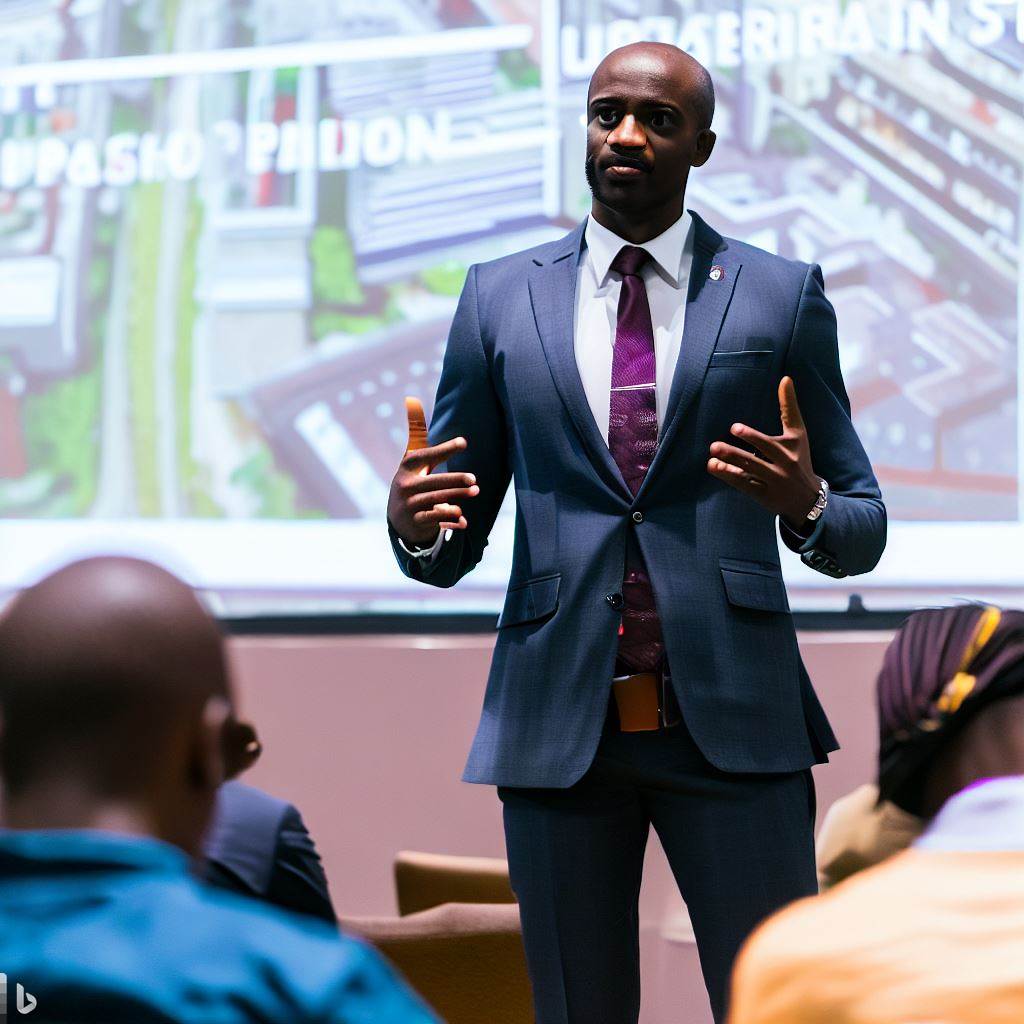Introduction
Urban planning in Nigeria involves the process of designing and organizing urban areas to ensure efficient development.
It includes strategies to manage population growth, infrastructure, and land use.
Education and skills play a vital role in urban planning as they enable professionals to effectively address challenges and make informed decisions.
A solid educational foundation equips planners with the theoretical knowledge of urban design principles, environmental sustainability, and socioeconomic factors.
Additionally, practical skills such as data analysis, GIS mapping, and stakeholder engagement enhance their ability to plan and implement sustainable urban projects.
Urban planners must understand the unique characteristics and complexities of Nigerian cities, considering cultural, economic, and infrastructural dynamics.
By incorporating education and skills, planners can develop inclusive and livable cities that cater to the needs of diverse communities.
Furthermore, education and skills development ensure that planners keep up with emerging technologies and global best practices, fostering innovation and efficiency.
The importance of continuous learning and professional development cannot be overstated in urban planning.
It enables planners to adapt to evolving urban challenges, such as rapid urbanization, climate change, and social inequality.
In short, education and skills are crucial for urban planning in Nigeria. They empower planners to create sustainable and resilient cities that improve the quality of life for all residents.
Education in Urban Planning
Urban planning is a critical aspect of Nigeria’s development, aimed at ensuring efficient land use, infrastructure provision, and social welfare.
To navigate the complexities of urban planning, professionals require a solid educational foundation.
Overview of the educational requirements
- Obtaining a bachelor’s degree is the first step towards a successful career in urban planning.
- A master’s degree in urban planning or a related field provides a deeper understanding of the discipline.
- Doctoral degrees are available for individuals interested in research or academia.
Highlighting relevant degrees and programs
- Bachelor of Urban and Regional Planning (BURP) is an undergraduate program that offers a comprehensive introduction to urban planning principles.
- Master of Urban Planning (MUP) is a graduate program that focuses on advanced planning theories and practices.
- Master of City and Regional Planning (MCRP) offers specialized knowledge for planning interventions at different scales in urban areas.
Emphasizing the need for specialized knowledge
Urban planning in Nigeria requires professionals to possess specialized knowledge in various areas:
- Transportation Planning: Understanding the intricacies of transportation systems to ensure efficient mobility.
- Housing and Land Use: Developing strategies for affordable housing and managing land use patterns.
- Environmental Planning: Promoting sustainable practices and mitigating the impact of urbanization on the environment.
- Economic Development Planning: Planning for economic growth and the creation of job opportunities.
Discussing the role of internships and practical experience
In addition to formal education, practical experience gained through internships or work placements is invaluable:
- Internships provide an opportunity to apply theoretical knowledge to real-world scenarios.
- Working with experienced professionals helps foster skills in problem-solving and project implementation.
- Internships can also serve as a pathway to future employment, allowing individuals to build professional networks.
Education is the foundation of a successful career in urban planning in Nigeria.
The field requires professionals to obtain relevant degrees, such as BURP, MUP, or MCRP, and gain specialized knowledge in areas like transportation planning, housing, and land use.
Practical experience through internships further enhances skills and opens doors to future opportunities.
Read: Analyzing The Architect’s Role in Nigeria’s Real Estate
Skills Needed for Urban Planning in Nigeria
Analytical skills and problem-solving abilities
Urban planners in Nigeria need strong analytical skills to assess complex urban challenges efficiently.
They must possess exceptional problem-solving abilities to develop effective solutions for urban issues.
Understanding of economics and public policy
Urban planning requires a deep comprehension of economics to analyze the financial viability of development projects.
A solid understanding of public policy is essential for navigating the regulatory and legal aspects of urban planning.
Excellent communication and negotiation skills
Effective communication is crucial for urban planners to convey ideas, gather feedback, and collaborate with diverse stakeholders.
Negotiation skills are necessary to mediate conflicts and reach consensus among different interest groups.
Read: Dissecting The Architect Registration Council of Nigeria
Knowledge of architectural design and urban development
Urban planners must have a comprehensive understanding of architectural design principles to create functional and aesthetically pleasing urban spaces.
They need to be knowledgeable about urban development trends, including sustainable practices and smart city concepts.
Familiarity with GIS and other planning software
Proficiency in Geographic Information Systems (GIS) and other planning software is critical for urban planners in Nigeria.
These tools enable them to analyze spatial data, map resources, and simulate the impact of various planning scenarios.
Urban planning in Nigeria requires a diverse set of skills to tackle the complex challenges and promote sustainable development.
Here are some essential skills that urban planners need to possess:
Analytical skills and problem-solving abilities
Urban planners in Nigeria need strong analytical skills to assess the various factors influencing urban development.
They must be able to analyze data, identify patterns, and develop innovative solutions to address urban challenges in a sustainable manner.
Understanding of economics and public policy
Urban planning involves making decisions that have significant economic implications.
Planners must have a solid understanding of economic principles and public policy to evaluate the financial viability of development projects and ensure that they align with government regulations.
Excellent communication and negotiation skills
Urban planners often work with diverse stakeholders, including government officials, developers, community members, and other professionals.
Effective communication skills are vital for urban planners to convey their ideas, listen to different perspectives, and build consensus among stakeholders.
Negotiation skills are also crucial for resolving conflicts and reaching agreements that benefit the community.
Knowledge of architectural design and urban development
Urban planners must have a basic understanding of architectural design and urban development principles.
This knowledge allows them to create functional and aesthetically pleasing urban spaces that meet the needs of the population while adhering to sustainable design practices.
Familiarity with GIS and other planning software
Geographic Information Systems (GIS) and other planning software are essential tools for urban planners in Nigeria.
These tools enable planners to analyze spatial data, map resources, and simulate the impact of various planning scenarios.
Familiarity with these technologies helps in making informed decisions and developing evidence-based urban plans.
In fact, urban planning in Nigeria demands a range of skills including analytical thinking, economic understanding, effective communication, architectural knowledge, and proficiency in planning software.
By honing these skills, urban planners can contribute to the development of sustainable and thriving cities in Nigeria.
Read: Becoming an Urban Planner in Nigeria: A Comprehensive Guide

Challenges in Urban Planning Education and Skill Development in Nigeria
List of Challenges
- Limited availability of accredited planning programs.
- Inadequate funding for education and urban planning projects.
- Lack of awareness and recognition of urban planning as a profession.
- Need for continuous professional development opportunities.
Education and skills are pivotal for effective urban planning, profoundly influencing sustainable urban development.
In Nigeria, formidable obstacles hinder the nurturing of competent urban planners. A pivotal challenge is the dearth of accredited planning programs.
Scarcity of universities offering specialized urban planning courses impedes aspiring planners’ acquisition of necessary expertise.
This scarcity curbs the growth of urban planning as a profession. Compounding this scarcity is insufficient funding, exacerbating educational challenges.
Inadequate resources allocated to education and planning projects limit training quality and scope. Modern facilities and practical learning opportunities remain restricted.
Another significant hurdle is the limited awareness and acknowledgment of urban planning as a profession.
Insufficient comprehension of planners’ roles curtails support for their education and skill advancement.
Additionally, continuous professional growth for practicing urban planners is imperative.
Nigeria lacks consistent training programs, hindering career progress and knowledge enrichment.
Addressing these concerns necessitates collaboration between government and educational institutions.
Amplifying accredited planning programs and allocating funding for modernization and practical learning are essential.
Public awareness campaigns can illuminate urban planning’s significance and career paths.
Establishing ongoing professional development platforms ensures planners stay current. Collective efforts can thus usher in a brighter future for urban planning in Nigeria.
Read: Understanding the Roles of Urban Planners in Nigeria
Suggestions for Improving Education and Skills in Urban Planning
Advocacy for increased funding and attention to planning education
- Raise awareness about the importance of urban planning education in Nigeria.
- Engage with policymakers to prioritize funding for urban planning programs and research.
- Collaborate with professional associations to lobby for increased support and recognition.
Collaboration between universities and urban planning agencies
- Enhance partnerships between universities and urban planning agencies to bridge the gap between academic knowledge and practical skills.
- Facilitate exchange programs and joint research initiatives to foster collaboration and knowledge sharing.
- Encourage professionals from urban planning agencies to serve as guest lecturers or mentors in universities.
Internship and mentorship programs for aspiring planners
- Establish internship programs with urban planning agencies to provide practical experience for aspiring planners.
- Encourage experienced planners to volunteer as mentors, guiding and supporting young professionals.
- Collaborate with private sector firms to create internship opportunities in urban planning-related fields.
Encouraging research and knowledge sharing in the field
- Promote research grants and funding opportunities to incentivize academic research in urban planning.
- Foster collaboration between universities, research institutions, and government agencies for data sharing and analysis.
- Create platforms for researchers to present their findings and exchange knowledge at conferences and seminars.
Creating networking and professional development platforms
- Establish an online platform where urban planners can connect, share resources, and seek professional advice.
- Organize regular networking events, workshops, and seminars to facilitate knowledge exchange and skill development.
- Encourage continuing education programs and professional certification to enhance the skills of practicing urban planners.
These strategies will help enhance education and skills in urban planning in Nigeria, ultimately leading to better urban development and sustainable cities.
It is crucial for stakeholders, including government agencies, universities, professional associations, and aspiring planners, to collaborate and take proactive steps towards improving education and skills in this field.
By investing in quality education, fostering collaboration, and creating networking opportunities, Nigeria can build a strong generation of urban planners equipped to tackle the challenges of rapid urbanization and create livable and resilient cities.
Read: Demand and Job Prospects for Urban Planners in Nigeria
Conclusion
Education and skills play a crucial role in urban planning in Nigeria.
Urban planners need a strong foundation in relevant fields and skills to effectively contribute to the development of sustainable and well-planned cities.
Investing in education and skill development in urban planning is vital for the growth and progress of Nigeria’s urban areas.
It is essential for stakeholders, including government bodies, institutions, and industry professionals, to acknowledge the significance of education and skills in urban planning and provide adequate support.
By investing in education and skill development, stakeholders can ensure that urban planners have the knowledge and expertise required to address the complex challenges faced by Nigerian cities.
This investment will result in the creation of sustainable and well-planned cities that enhance the quality of life for residents.
Urban planning is not just a technical discipline; it is an interdisciplinary field that requires continuous learning and upgrading of skills.
It is important for stakeholders to promote lifelong learning opportunities for urban planners to stay updated with emerging trends, new technologies, and best practices in urban planning.
In summary, education and skills are integral to the success of urban planning in Nigeria.
Stakeholders should prioritize investing in education and skill development to create a pool of competent and qualified urban planners who can contribute effectively to the development of sustainable and well-planned cities in Nigeria.




